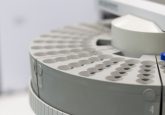Could protein microarrays be used in the early detection of breast cancer?

Scientists from the Centre of Excellence for Autoimmunity in Cancer group at the School of Medicine, University of Nottingham (UK) presented a simple blood test that could be used in the early detection of breast cancer at the 2019 NCRI Cancer Conference (3–5 November, Glasgow, UK).
The pilot study analyzed blood samples from 90 breast cancer patients at the time of diagnosis and 90 blood samples from individuals without breast cancer diagnoses. The team utilized protein microarrays to rapidly screen the blood samples, successfully identifying the presence of autoantibodies against 40 tumor-associated antigens (TAAs) and 27 TAAs not currently associated with breast cancer.
Daniyah Alfattani, a PhD student in the research group, explained: “The results of our study showed that breast cancer does induce autoantibodies against panels of specific TAAs. We were able to detect cancer with reasonable accuracy by identifying these autoantibodies in the blood.”
The results of the study demonstrated that the accuracy of the test increases with the number of TAAs in the panel. Maximum accuracy was achieved using a panel of nine TAAs, which successfully identified cancer in 37% of cancer samples and no cancer in 79% of control samples.
The research group is continuing the development of the test, analyzing samples from 800 patients against the panel of nine TAAs. The team estimate that a fully funded development program could result in the test reaching the clinic in 4–5 years.
Alfattani concluded: “We need to develop and further validate this test, however, these results are encouraging and indicate that it’s possible to detect a signal for early breast cancer. Once we have improved the accuracy of the test, then it opens the possibility of using a simple blood test to improve early detection of the disease.”
Sources: Abstract: Daniyah Alfattani, Clinical utility of autoantibodies in early detection of breast cancer. Presented at: NCRI Cancer Conference, Glasgow, UK, 3–5 November 2019; www.eurekalert.org/pub_releases/2019-11/ncri-sbt103119.php





